There was one dish that always signaled a special occasion - my Lola's crispy Lumpiang Shanghai. Every time I make these golden-brown Filipino spring rolls now, the familiar crackle of the wrapper and the savory aroma of the filling instantly takes me back to Sunday family gatherings, where I'd help her in the kitchen, learning the secret to rolling them just right.
While some might think making lumping shanghai is tedious, I've discovered it's actually the perfect excuse to catch up with family. My kids now stand on their little steps beside me, just like I did with my Lola, helping to roll these crispy treats that disappear faster than we can fry them.
This tried-and-tested lumpiang shanghai recipe combines ground chicken (though you can use pork like many traditional versions), water chestnuts for that signature crunch, and fresh vegetables, all wrapped in delicate lumpia wrappers and fried to perfect crispiness.
What is Lumpiang Shanghai?
Lumpiang Shanghai is the quintessential Filipino spring roll: a savory blend of ground meat, water chestnuts, and aromatic vegetables tightly wrapped in delicate crepes and fried until golden-crisp. These bite-sized appetizers feature a satisfying crunch that gives way to a juicy, flavorful filling—making them an irresistible staple at Filipino celebrations and family gatherings.
Jump to:
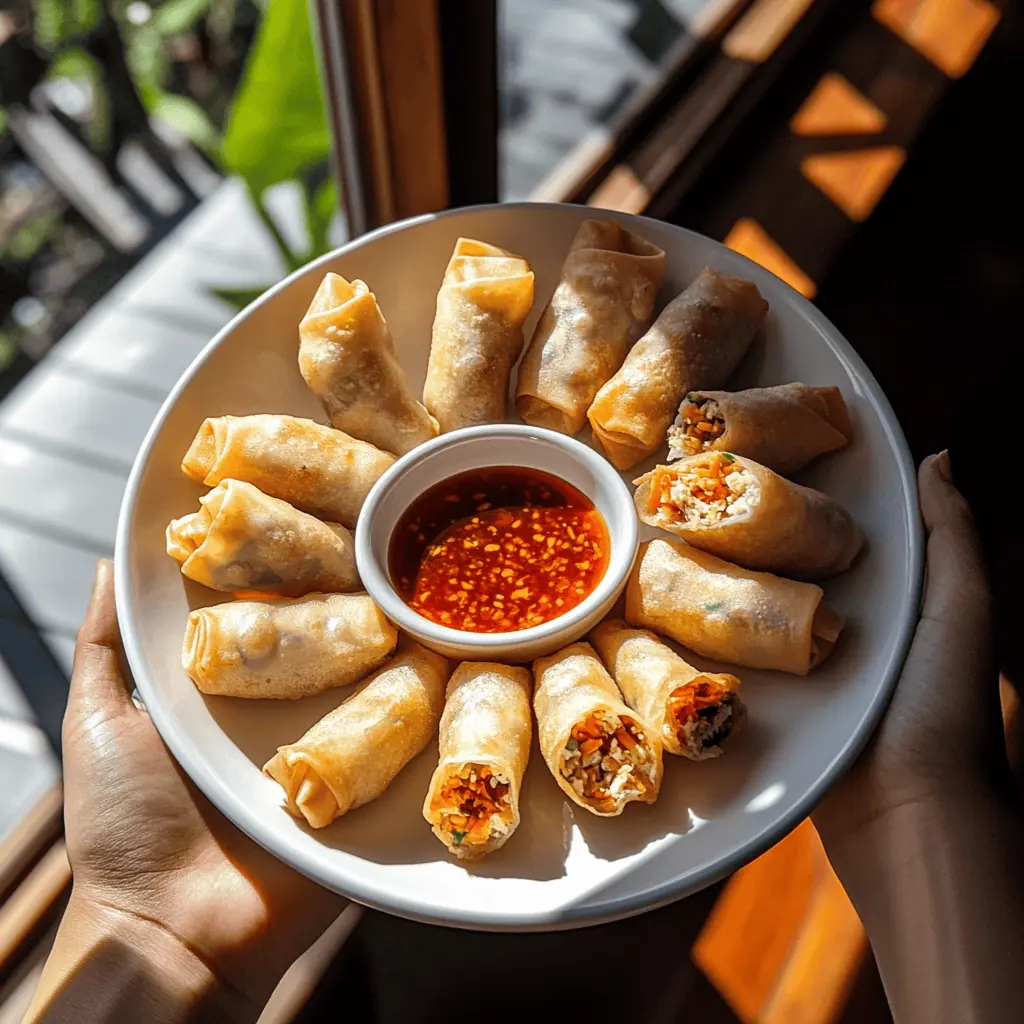
Why You'll Love This Recipe
- Make-ahead friendly - perfect for batch cooking
- Crispy exterior with juicy filling
- Versatile - works as appetizer or main dish
- Freezer-friendly for up to 3 months
- Party crowd favorite
- Kid-friendly finger food
- Authentic Filipino taste
Ingredients
The ingredients in Lumpiang Shanghai create a perfect balance of flavors and textures. Ground meat forms the savory base, while water chestnuts add essential crunch that contrasts with the soft filling. Carrots provide natural sweetness and color, while green onions and garlic deliver aromatic depth. Soy sauce introduces umami that ties everything together.
When wrapped in thin, crispy spring roll wrappers and fried until golden, these simple ingredients transform into something greater than their parts, creating that distinctive combination of juicy interior and crispy exterior that makes Lumpiang Shanghai impossible to resist at any Filipino gathering.
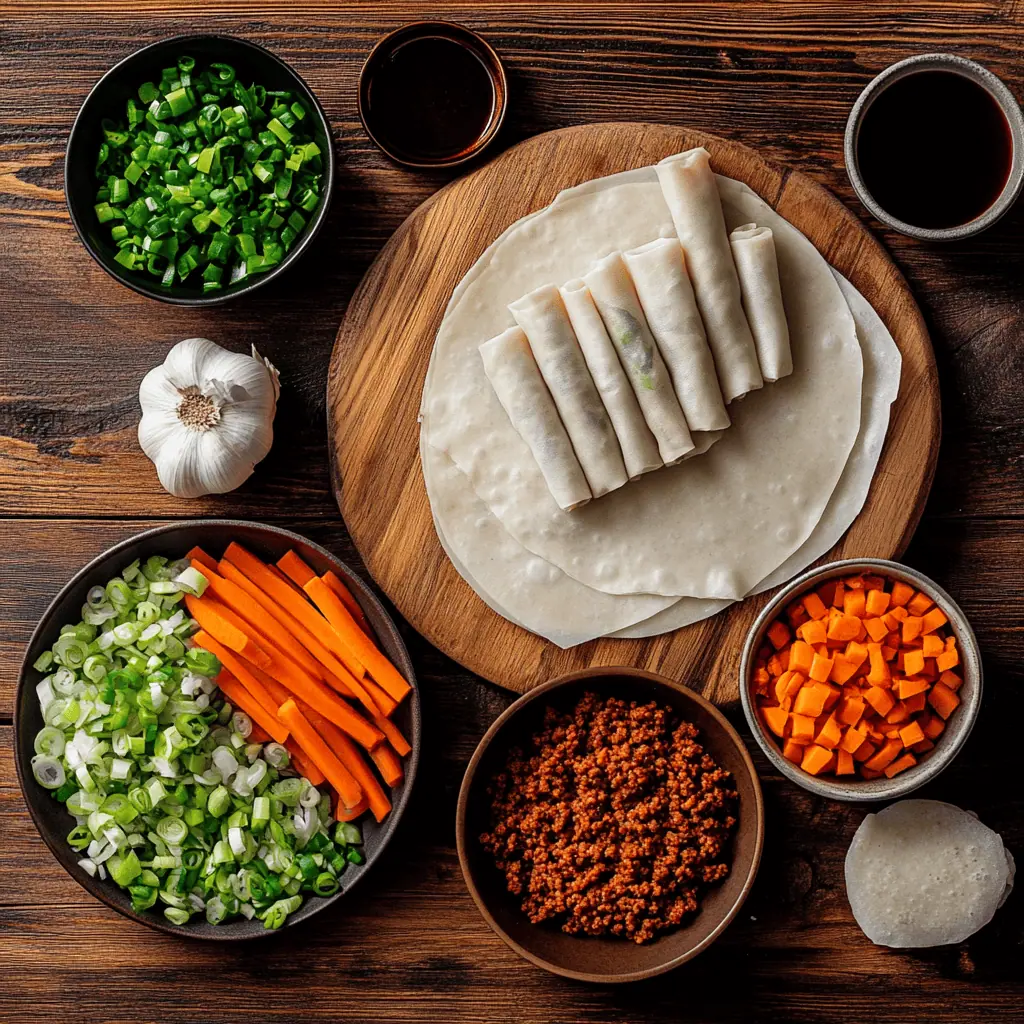
- 1 pound ground chicken (or pork)
- ½ cup green onions, finely chopped
- 1 can (8 ounces) water chestnuts, drained and finely chopped
- 1 medium carrot, peeled and shredded
- 3 cloves garlic, peeled and minced
- 1 tablespoon soy sauce
- 1 teaspoon salt
- ½ teaspoon ground black pepper
- 20 pieces spring roll wrappers
- Canola oil for frying
Equipment
- Large mixing bowl - For combining all filling ingredients thoroughly
- Food processor - To finely chop vegetables quickly and uniformly
- Deep heavy-bottomed pot - Provides even heat distribution for perfect frying
- Candy/oil thermometer - Essential for maintaining the ideal oil temperature of 350°F
- Wire rack - Allows excess oil to drain while keeping rolls crispy
- Cutting board and knife - For prep work and cutting ingredients
- Kitchen scissors - Makes cutting rolled lumpia into pieces easy and precise
- Small bowl with water - Used for sealing the wrapper edges

How To Make
- Prepare the filling at room temperature. In a large bowl, combine ground chicken or pork, finely chopped green onions, drained and chopped water chestnuts, shredded carrots, minced garlic, soy sauce, salt, and ground black pepper. Mix thoroughly but gently. Test the seasoning by frying a small portion and adjust if needed.
- Assembly: Carefully separate your spring roll wrappers, keeping them covered with a damp cloth to prevent drying. Place one wrapper like a diamond on your work surface. Put about 1 tablespoon of filling near the bottom edge. Roll tightly, folding in the sides, and seal the edges with water. Cut into 3-inch pieces. Continue until all filling is used.
- Frying: Heat oil in a deep pot to 350°F (175°C). Fry the lumpia in batches, being careful not to overcrowd the pan, for 3-4 minutes or until golden brown. Remove with tongs and drain on a wire rack, not paper towels, to maintain crispiness.
- Serve hot with sweet chili sauce, banana ketchup, or traditional vinegar-garlic dip. Uncooked rolls can be frozen for up to 3 months - do not thaw before frying, just add 1-2 minutes to cooking time.

Tips from Lola's Kitchen
- Keep wrappers moist: Cover unused wrappers with a damp cloth while working to prevent them from drying out and cracking
- Roll tightly: Ensure rolls are as tight as possible to prevent oil from seeping into the filling
- Monitor oil temperature: Check between batches to maintain consistent 350°F heat - too hot will burn wrappers, too cool makes greasy lumpia
- Avoid overcrowding: Fry in small batches to maintain oil temperature and ensure even cooking
- Use fresh ingredients: The quality of your filling directly impacts flavor - fresh garlic and vegetables make a noticeable difference
- Pre-chill filling: Letting the filling rest in the refrigerator for 30 minutes makes it easier to handle and wrap
Traditional Serving Suggestions
- Sweet chili sauce
- Banana ketchup
- Vinegar-garlic dip (mix ½ cup white vinegar with 3 crushed garlic cloves and a pinch of pepper)
- Serve alongside Pancit Canton or steamed rice
- Perfect as pulutan (Filipino beer snack)
Substitutions
- Ground chicken → ground pork, beef, turkey, or a combination
- Water chestnuts → jicama for similar crunch or finely diced bamboo shoots
- Green onions → regular yellow onions, minced finely
- Spring roll wrappers → egg roll wrappers (though slightly thicker)
- Canola oil → vegetable oil, peanut oil, or any neutral high-heat oil
Troubleshooting
- Wrapper breaking: Your wrappers may be too dry or old Solution: Use fresh wrappers and keep them covered with a damp cloth
- Filling falling out: You might be overfilling or rolling too loosely Solution: Use 1 tablespoon of filling maximum and practice tight rolling technique
- Greasy lumpia: Oil temperature is likely too low Solution: Maintain 350°F/175°C consistently and use a thermometer to check
- Lumpia burning too quickly: Oil temperature is too high Solution: Lower heat and verify with thermometer before adding next batch
- Filling too dry after cooking: Not enough fat in meat mixture Solution: Use ground meat with higher fat content (80/20) or add 1 tablespoon oil to leaner meats
Storage & Reheating
Storage:
- Refrigerator: Store cooked lumpia in an airtight container for up to 3 days
- Freezer (uncooked): Flash freeze individually on a baking sheet first, then transfer to freezer bags for up to 3 months
- Freezer (cooked): Allow to cool completely, then freeze in airtight containers for up to 1 month
Reheating:
- Fresh (refrigerated): Re-fry at 350°F for 1-2 minutes until hot and crispy again
- Frozen (uncooked): Do not thaw, fry directly at 350°F for 4-5 minutes
- Frozen (cooked): Reheat in 350°F oven for 10 minutes or air fryer at 370°F for 3-4 minutes
- Quick reheating: Microwave for 20 seconds to warm filling, then place in toaster oven for 2-3 minutes to crisp exterior
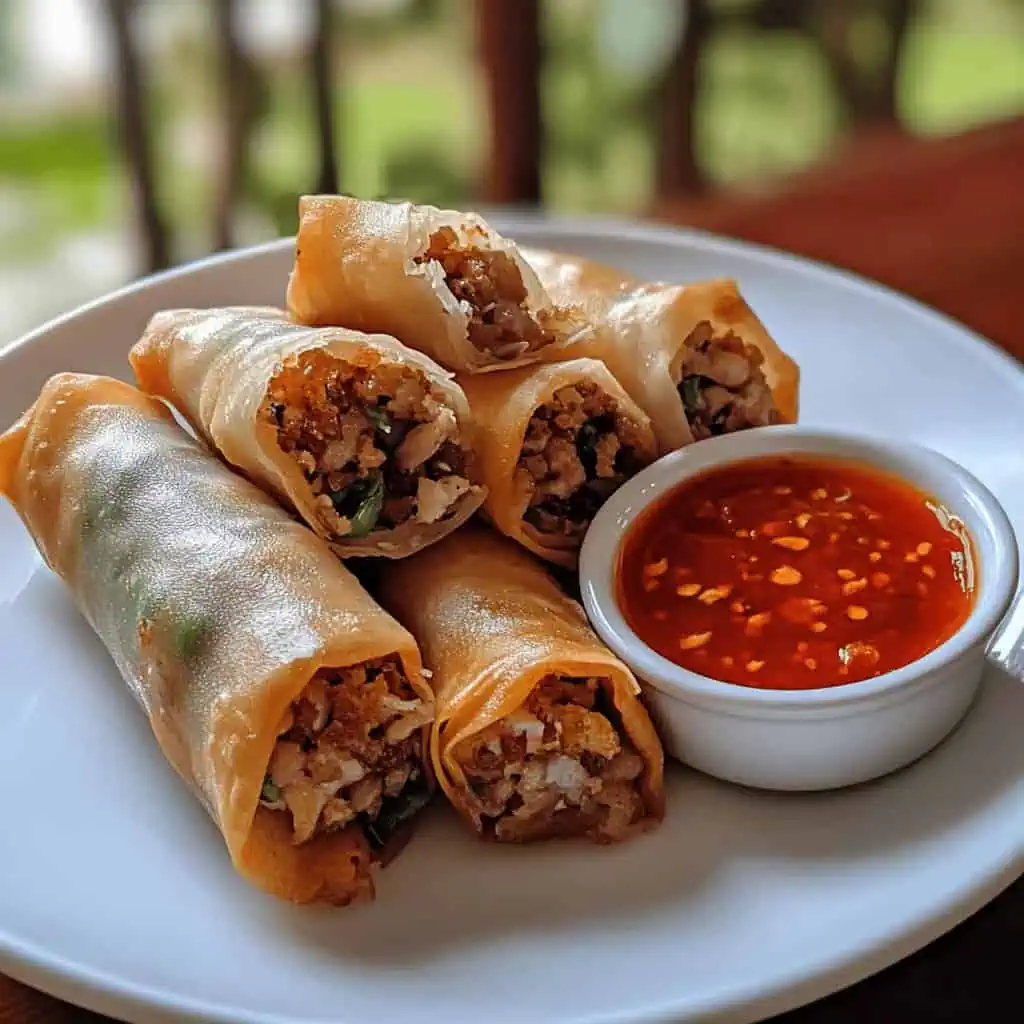
FAQ
Can I air fry these instead of deep frying?
Yes! Spray with oil and cook at 400°F for 8-10 minutes, turning halfway through for even browning.
Can I make them ahead for a party?
Absolutely. You can prepare and freeze uncooked rolls for up to 3 months. Fry them directly from frozen when needed.
Why are my lumpia not crispy?
This usually happens when the oil temperature is too low or when you drain them on paper towels (which steams them). Use a wire rack instead.
Can I use egg roll wrappers instead of spring roll wrappers?
Yes, though spring roll wrappers give a thinner, crispier result. Egg roll wrappers will work but create a slightly thicker exterior.
How do I prevent lumpia from getting soggy when serving at a party?
Keep them warm in a 200°F oven on a wire rack until serving. Avoid covering them tightly, as trapped steam causes sogginess.
Can I bake these instead of frying?
Yes, though the texture will be different. Brush with oil, bake at 425°F for 15-20 minutes, turning halfway.
What's the best way to transport lumpia to a potluck?
Allow them to cool completely before packing in containers with paper towels between layers. Reheat in oven at the destination.
How do I know when the oil is at the right temperature without a thermometer?
Drop a small piece of wrapper in the oil - it should bubble immediately and float to the surface, but not burn quickly.
Related
Looking for other recipes like this? Try these:
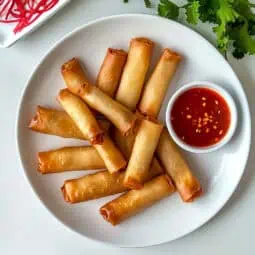
Lumpiang Shanghai (Filipino Spring Rolls)
Equipment
- Large mixing bowl (Malaking mangkok) for combining filling ingredients
- Food processor for finely chopping vegetables
- Deep heavy-bottomed pot (Kawaling malalim) for deep frying
- Candy/oil thermometer for monitoring oil temperature
- Wire rack (pampalamig) for draining excess oil
- Cutting board and knife (Sangkalan at kutsilyo) for prep work
- Kitchen scissors (Gunting) for cutting rolls
- Small bowl with water for sealing wrappers
Ingredients
- 1 pound ground chicken giniling na manok or pork (giniling na baboy)
- ½ cup green onions sibuyas dahon, finely chopped
- 1 can 8 ounces water chestnuts (kastanyas), drained and finely chopped
- 1 medium carrot karot, peeled and shredded
- 3 cloves garlic bawang, peeled and minced
- 1 tablespoon soy sauce toyo
- 1 teaspoon salt asin
- ½ teaspoon ground black pepper paminta
- 20 pieces spring roll wrappers balat ng lumpia
- Canola oil for frying
Instructions
- Begin by preparing the filling at room temperature. In a large bowl, combine ground chicken (giniling na manok) or pork, finely chopped green onions (sibuyas dahon), drained and chopped water chestnuts (kastanyas), shredded carrots, minced garlic (bawang), soy sauce (toyo), salt (asin), and ground black pepper (paminta). Mix thoroughly but gently. Test the seasoning by frying a small portion and adjust if needed.
- For assembly, carefully separate your spring roll wrappers (balat ng lumpia), keeping them covered with a damp cloth to prevent drying. Place one wrapper like a diamond on your work surface. Put about 1 tablespoon of filling near the bottom edge. Roll tightly, folding in the sides, and seal the edges with water. Cut into 3-inch pieces. Continue until all filling is used.
- Heat oil in a deep pot to 350°F (175°C). Fry the lumpia in batches, being careful not to overcrowd the pan, for 3-4 minutes or until golden brown. Remove with tongs and drain on a wire rack, not paper towels, to maintain crispiness.
- Serve hot with sweet chili sauce (suka at sili), banana ketchup, or traditional vinegar-garlic dip (suka at bawang). Uncooked rolls can be frozen for up to 3 months - do not thaw before frying, just add 1-2 minutes to cooking time.
Tips from Lola's Kitchen
- Keep wrappers covered with damp cloth while working
- Roll as tight as possible to prevent oil seepage
- Don't overcrowd the pan when frying
- Always check oil temperature between batches
- Use fresh wrappers for best results
Nutrition
The Story Behind Lumpiang Shanghai (Filipino Spring Rolls)
Growing up in the Philippines, there's no better sound than the sizzle of fresh lumpia hitting hot oil – a sure sign that a celebration is about to begin. Lumpiang Shanghai, despite its Chinese-inspired name, has evolved into one of the most beloved Filipino dishes, earning its place at every festive table from Manila to Mindanao.
This beloved appetizer showcases the beautiful fusion of Chinese and Filipino cuisines, a testament to the centuries-old trading relationship between the two cultures. While traditional Chinese spring rolls often feature vegetables as the star, the Filipino version distinguishes itself with a meat-filled center, reflecting our love for hearty, satisfying flavors. The name "Shanghai" was likely added to highlight its Chinese roots, though it's now as Filipino as adobo or sinigang.
The genius of Lumpiang Shanghai lies in its versatility. From simple family dinners to grand fiestas, these crispy rolls have a unique way of bringing people together. In typical Filipino households, making lumpia becomes a family affair – with someone mincing vegetables, another mixing the filling, and others carefully rolling each piece while sharing kwento (stories). This communal preparation is perhaps why every Filipino family claims to have the best lumpia recipe, each with its own secret ingredient or special technique passed down through generations.
What makes this finger food truly special is its ability to transcend occasions. It's elegant enough for formal gatherings but humble enough for merienda (afternoon snacks). You'll find it served at weddings alongside elaborate dishes, yet it's also the perfect baon (packed lunch) for school or work. Its popularity has even crossed borders, becoming a requested dish at Asian fusion restaurants worldwide, though anyone will tell you that nothing beats the homemade version.
Whether enjoyed piping hot from the kawali (wok) with sweet chili sauce, or eaten cold from baon the next day (yes, some prefer it this way!), Lumpiang Shanghai represents the heart of Filipino cooking – simple ingredients transformed through care and technique into something extraordinarily delicious that brings people together.
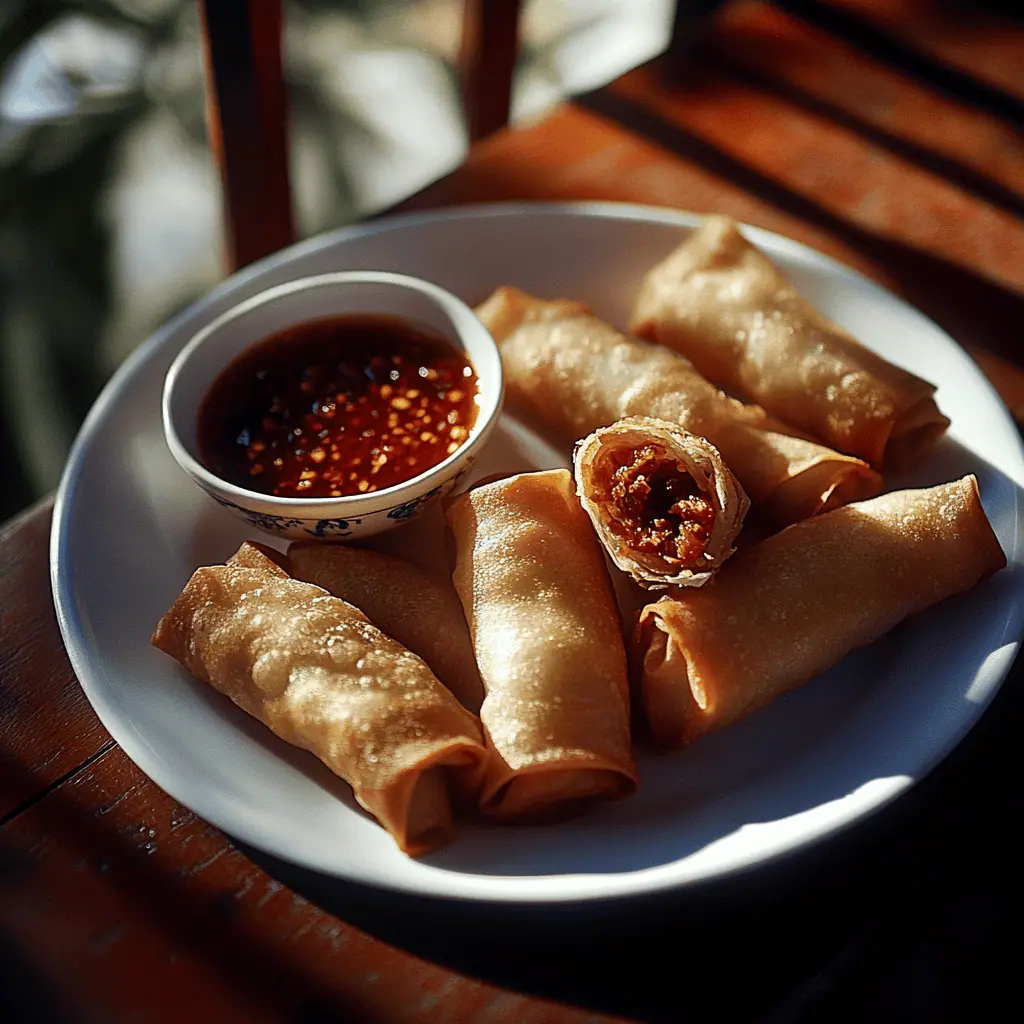

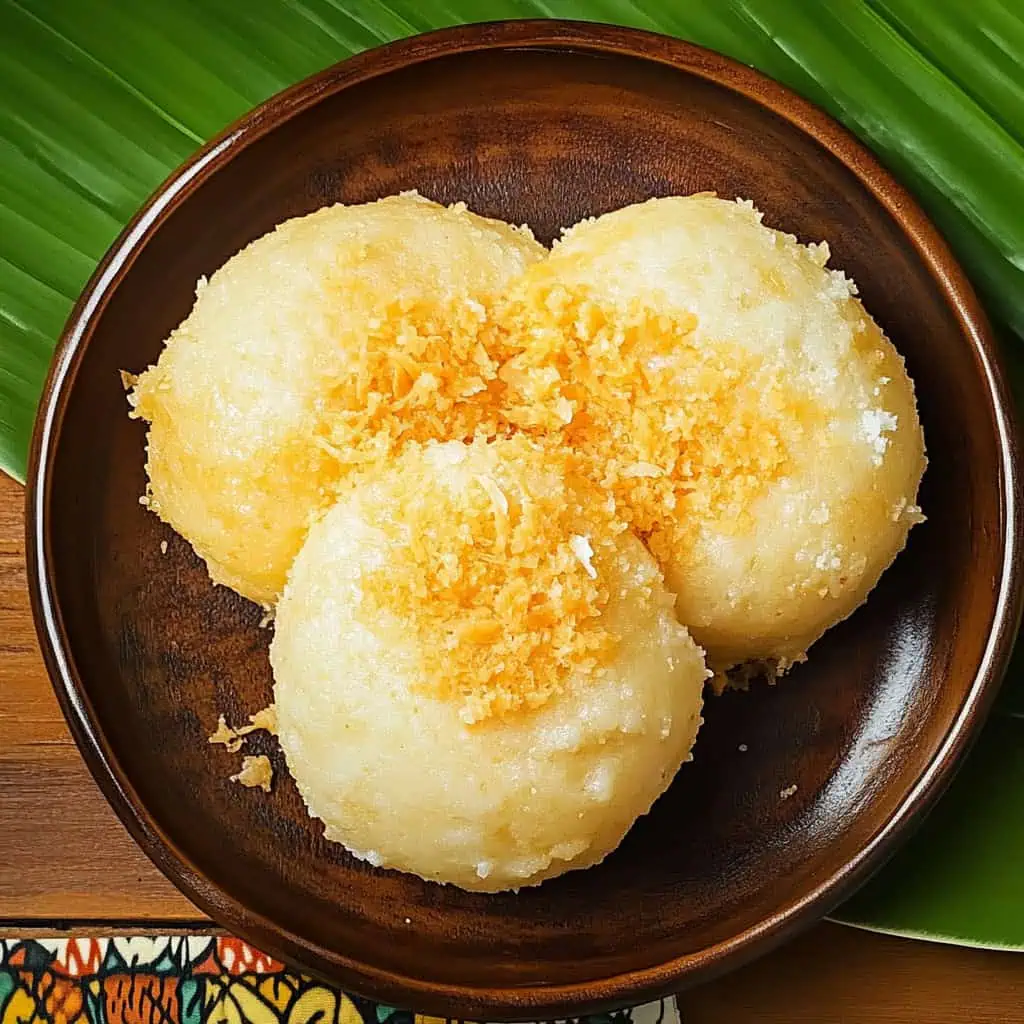
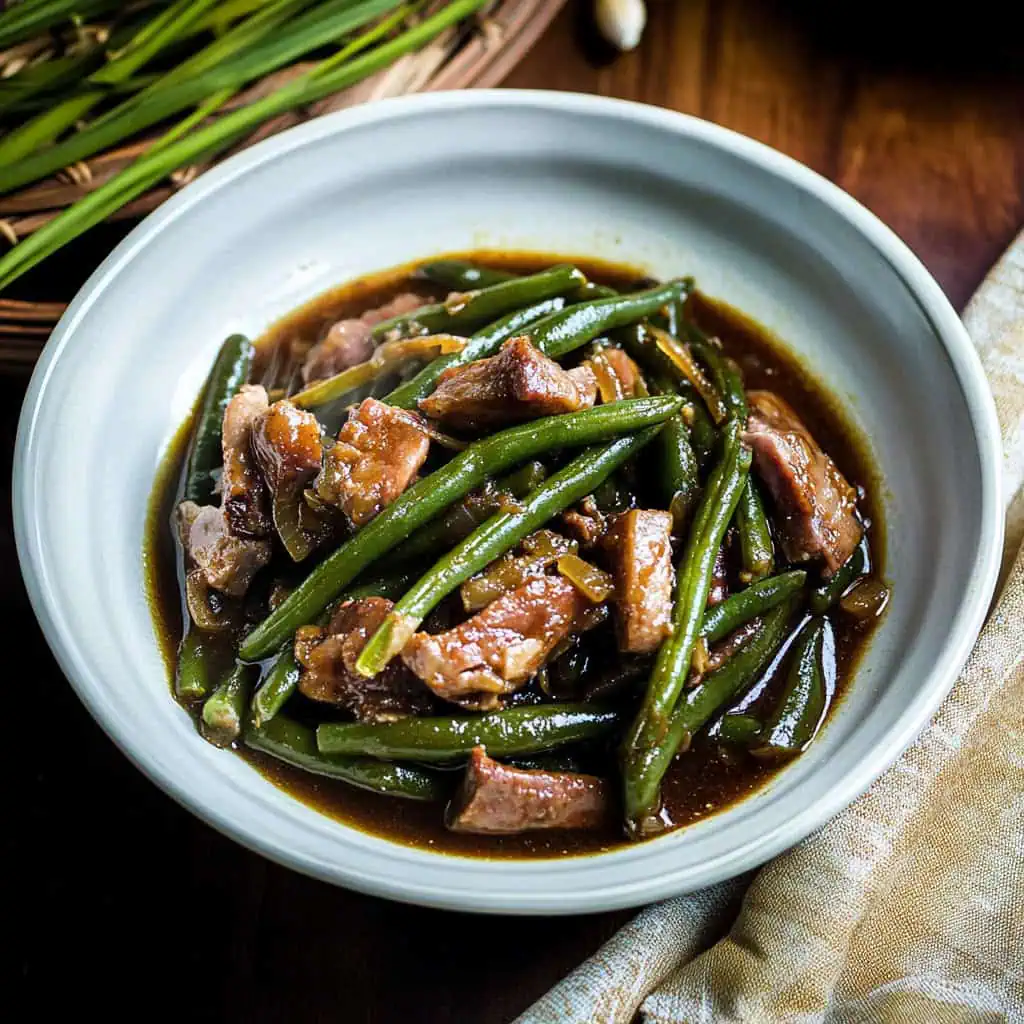

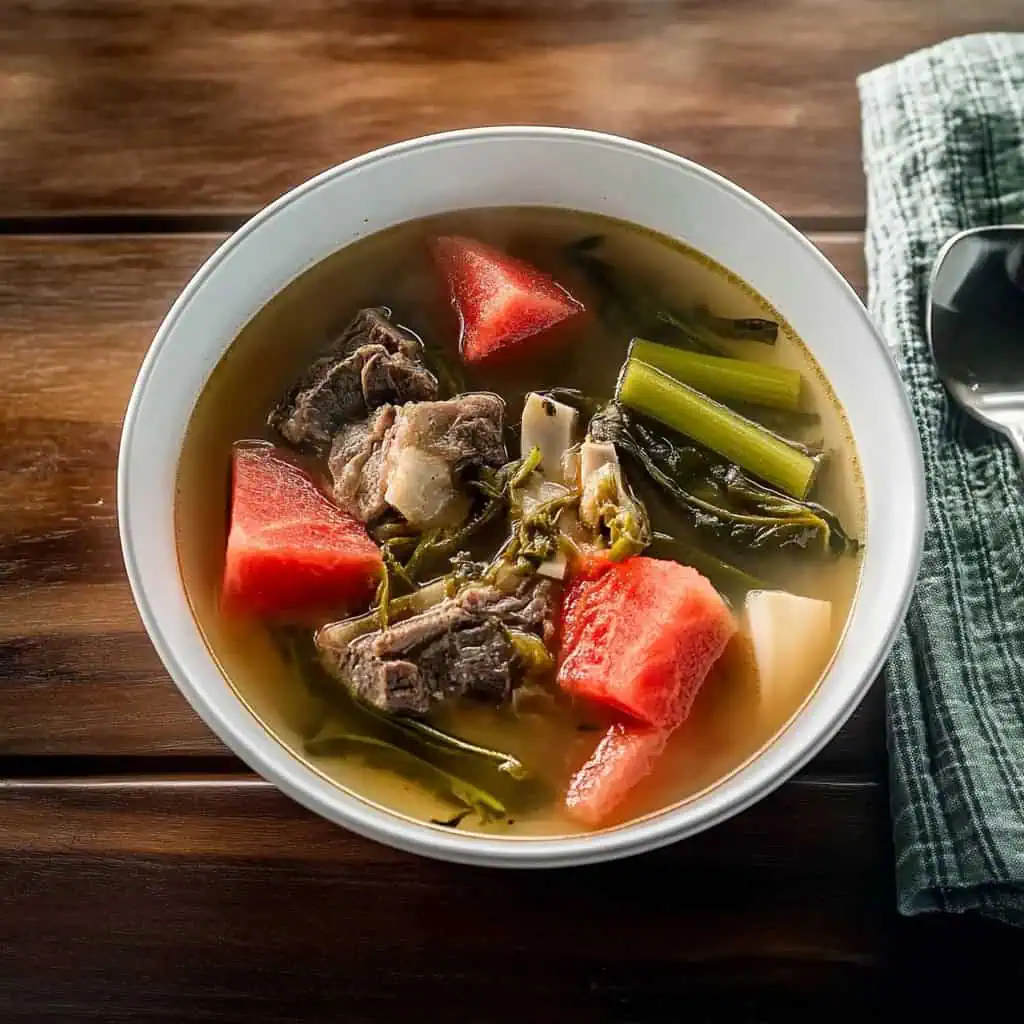
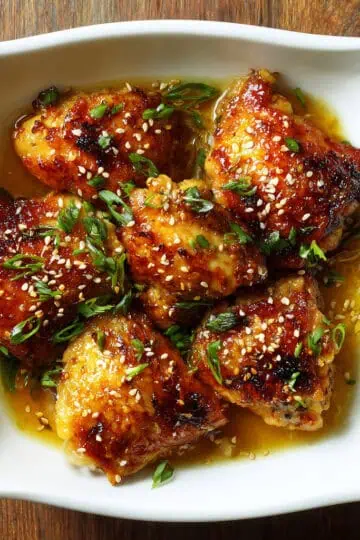
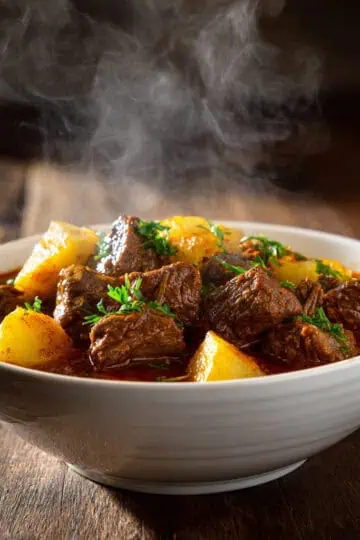
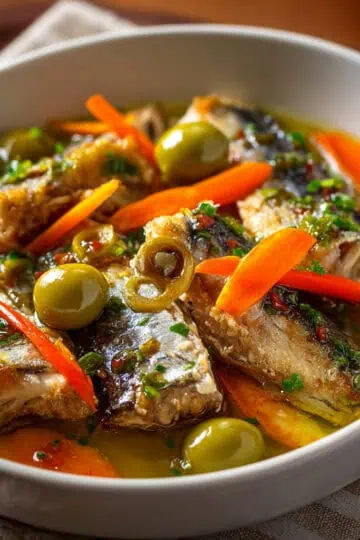
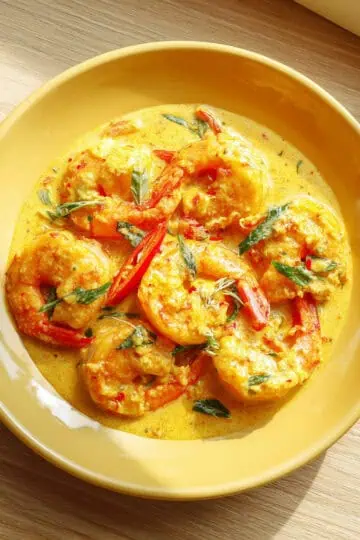
Comments
No Comments